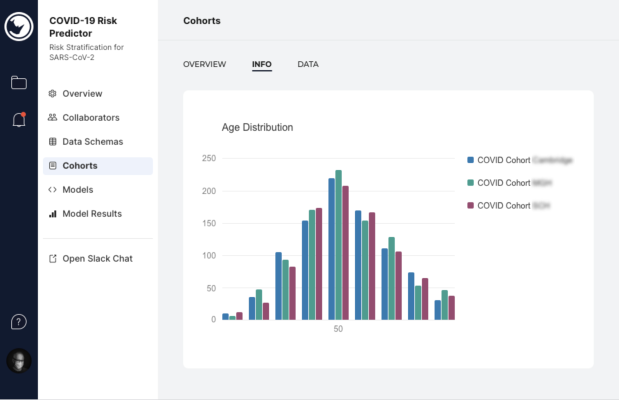
November 28, 2021 — Rhino Health announced a pilot project with the pancreatic cancer working group of the Early Detection Research Network (EDRN), focused on cross-institution collaboration to improve outcomes for people who have been diagnosed with or are predisposed to developing pancreatic cancer. Using federated learning (FL), participating institutions hope to bring on-board more collaborators and expedite the execution of large-scale research without the encumberment caused by the current need to share data.
The investigators will utilize multi-modal data—including CT scans, cinematic renderings and laboratory test results—to create AI models that accelerate diagnosis of pancreatic ductal adenocarcinoma (PDAC). When diagnosed earlier, the likelihood of survival is substantially higher. The researchers hope to enable earlier diagnosis and tailoring of more precise treatment. Participating institutions include Johns Hopkins Medicine, MD Anderson Cancer Center, Dana-Farber Cancer Institute, University of Pittsburgh Medical Center, Cedars-Sinai Medical Center, and City of Hope National Medical Center.
“One of the biggest challenges in pancreatic research is accessing the large datasets required to come to scientific conclusions,” said Elliot Fishman, M.D., professor of radiology, surgery, oncology and urology at Johns Hopkins Hospital. “No one institution can do it alone. Cross-institutional collaboration is essential to changing the trajectory for pancreatic cancer patients, and federated learning makes it possible for multiple researchers to utilize relevant data while always protecting privacy and without creating additional administrative or ‘IT burden’.”
With federated learning, artificial intelligence models are trained using data from disparate sources - without sharing or aggregating data. This protects privacy, facilitates access to more diverse datasets, and makes it easier for medical researchers and AI developers around the world to collaborate. Rhino Health has partnered with NVIDIA and is leveraging its technology in the Rhino Health Platform - an end-to-end federated learning solution that makes it possible for researchers to quickly get a project up and running and easily add collaborators.
“Rhino Health is putting the power of federated learning in the hands of leading medical researchers, building on the industry-leading capabilities made possible by NVIDIA technology,” said Mona Flores, M.D., head of medical AI at NVIDIA. “This platform approach is very aligned with our vision for the future of federated learning, which we believe will fundamentally change how healthcare AI is developed and deployed.”
“To realize the transformative promise of healthcare AI in the early detection of pancreatic cancer - and more broadly across the practice of radiology - we need to collectively adopt common standards and principles in managing and utilizing data,” said Eugene Koay, M.D., Ph.D., associate professor, Department of GI Radiation Oncology at MD Anderson Cancer Center. “Together, medical researchers and industry are doing this, and federated learning helps to ensure we’re keeping observations in context, maintaining high-quality data, and collaborating in a very transparent manner that ultimately serves patients.”
EDRN, backed by the National Cancer Institute (NCI), is a consortium of more than 300 investigators at academic institutions and in the private sector working to discover, develop and validate biomarkers and imaging methods to detect early-stage cancers and to assess risk for developing cancer, and to translate these biomarkers and imaging methods into clinical tests.
“Translating research findings into clinical practice requires assurance that an AI model will work consistently across today’s increasingly diverse real-world patient populations,” said Michael Rosenthal, M.D., Ph.D., assistant professor of radiology, Dana-Farber Cancer Institute, Brigham and Women’s Hospital, and Harvard Medical School. “This means we need to be utilizing diverse datasets from the early stages of research, and federated learning is critical to providing globally relevant generalizable methods of finding pancreatic cancer earlier.”
Several of the Principal Investigators in this pilot project will present their work and the intended collaboration with Rhino Health during a virtual industry presentation at the upcoming annual meeting of the Radiological Society of North America (RSNA). The session will take place online on Tuesday, Nov. 30 from 12:15–1:15 p.m. CT, titled, “Accelerating AI: How Federated Learning Can Protect Privacy, Facilitate Collaboration and Improve Outcomes.”
“We are humbled by the ingenuity and dedication of these leading physicians and scientists, who are revolutionizing clinical medicine, using artificial intelligence,” said Ittai Dayan, M.D., cofounder and CEO of Rhino Health. “For that, they need to be able to collaborate effectively and efficiently, using a common platform and without the risk of patient privacy breach. We hope that Rhino Health’s ‘Federated Learning as a Platform’ solution will be a useful tool at their disposal and help accelerate the impact of healthcare AI.”
For more information: www.rhinohealth.com


 February 13, 2026
February 13, 2026 









